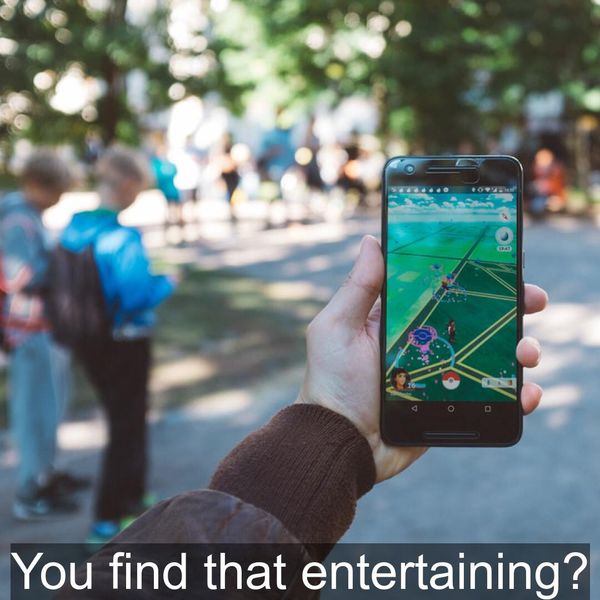I overheard a pair of couples, each in their late 40s, lamenting to each other in the grocery store's freezer aisle how they don’t understand their children. "Who just wants to text their friends all day, send pictures, and watch TikTok videos?" “What is friendships these days?" “How is a friend someone who you never see and just text all day?” After quickly selecting a pint of ice cream, I moved along, but this conversation stayed with me. Perhaps these parents don’t understand their kids or want for their kids something they had — a common sentiment any parent can share. But like most things, just because you don’t understand it doesn’t make it any less important.
Putting yourself into these children's shoes, you imagine that this is how they want to spend their time, how their friends spend their time. Certainly different than 'back in my day'. But I also see differences like these in my own kids, where my son wants to spend time with his friends walking around catching virtual Pokémon. On one hand, the AR game sensation Pokémon Go doesn’t make sense to me. If we let him, my son would walk around the historical site behind our home all day, which is also a virtual Pokémon training gym. But on the other hand, I see the future in this global phenomenon, despite not completely understanding it. However, it is a way for him to participate in something that he and his friend enjoy, and a way for them to spend time together. And, he has amassed a collection of virtual Pokémon that he has 'caught', is both excited and proud when he catches a new one, and is eager to share his latest catch with anyone who will listen.
The freezer aisle conversation and Pokemon Go both point to shifts in online behavior and online technologies. The pair in the freezer aisle might as well have been talking about web3, as the latest incantation of a new technology. Clearly, not everyone understands web3 (candidly, I put myself in this group still), which means that some will have a knee-jerk reaction like the pair in the freezer aisle: "I don’t get [insert technology here]," and that’s as far as some might get. But whether people like it or not, NFTs are now part of the cultural conversation. When the most recent Super Bowl runs several cryptocurrency ads, you know the edge technology has gone mainstream.
A major activity gaining all the attention in the web3 space is collecting digital artifacts. These are generally grouped into either fungible or non-fungible tokens (NFTs), the difference being whether the digital artifact I collected can be differentiated from yours. A unique piece of art is non-fungible (distinguishable from others and non-replaceable), but a poster of the same art bought in the giftshop is fungible (not distinguishable from yours and generally replaceable). Collecting virtual Pokémon is no different. My son‘s Pokémon that he caught is no different than the Pokémon that his friend caught; in web3 speak, it is equivalent to an ERC1155 token fungible token. Further, they both can show me that they both caught a Mega-Evolved Charmander in their digital Pokémon wallet.
Of course, the difference between Web2 and Web3 is that if Niantic, who developed and published Pokémon Go in collaboration with Nintendo and The Pokémon Co, decides that the Pokémon my son caught no longer exists, or that my son has broken some rules of the app, or if the company is sold or acquired to another company that decides that Pokémon is no longer relevant, or a myriad of other company decisions, his Pokémon goes away. In the web3 space, no arbiter could make this decision, because the record of the Pokémon would live on the blockchain.
So what can we learn from a pair of middle-aged parents in the freezer aisle, my son playing Pokémon, and new technologies?
- First, when presented with something you don’t understand, it signals that there is something to learn. As any parent knows, you need to practice radical empathy as you seek to understand it.
- Second, what people find entertaining is as varied as the person. Entertainment has always had a wide scope. The middle-aged couple might want to get together for a dinner party. Their teenage friends might send each other gifs or TikTok videos. My son might go capture virtual Pokémon, whereas I might write articles about technology (editors note: really?). No single form of entertainment is superior to another. It’s all fun and games after all.
- Third, notions of ownership and value are rapidly changing. Ideas about value and entertainment reflect shifts in culture, which means that people will continue to choose to spend time and money in different ways.
Part of the excitement around web3 is a change in what people can prove they own. Blockchain technology means that digital ownership has a trail of provenance. You don't need a creative leap to see how collecting virtual Pokémon in one generation leads to collecting digital artifacts like tokens, digital art, NFTs, and beyond in the next generation. As I've written before, "something is happening on the internet". Owing something leads to a whole new marketplace of incentives and value, a whole new ecosystem of identity and community, a whole new world of interactions and entertainment. And while I might not understand all of it, at least it'll be entertaining. And I'll have ice cream.
